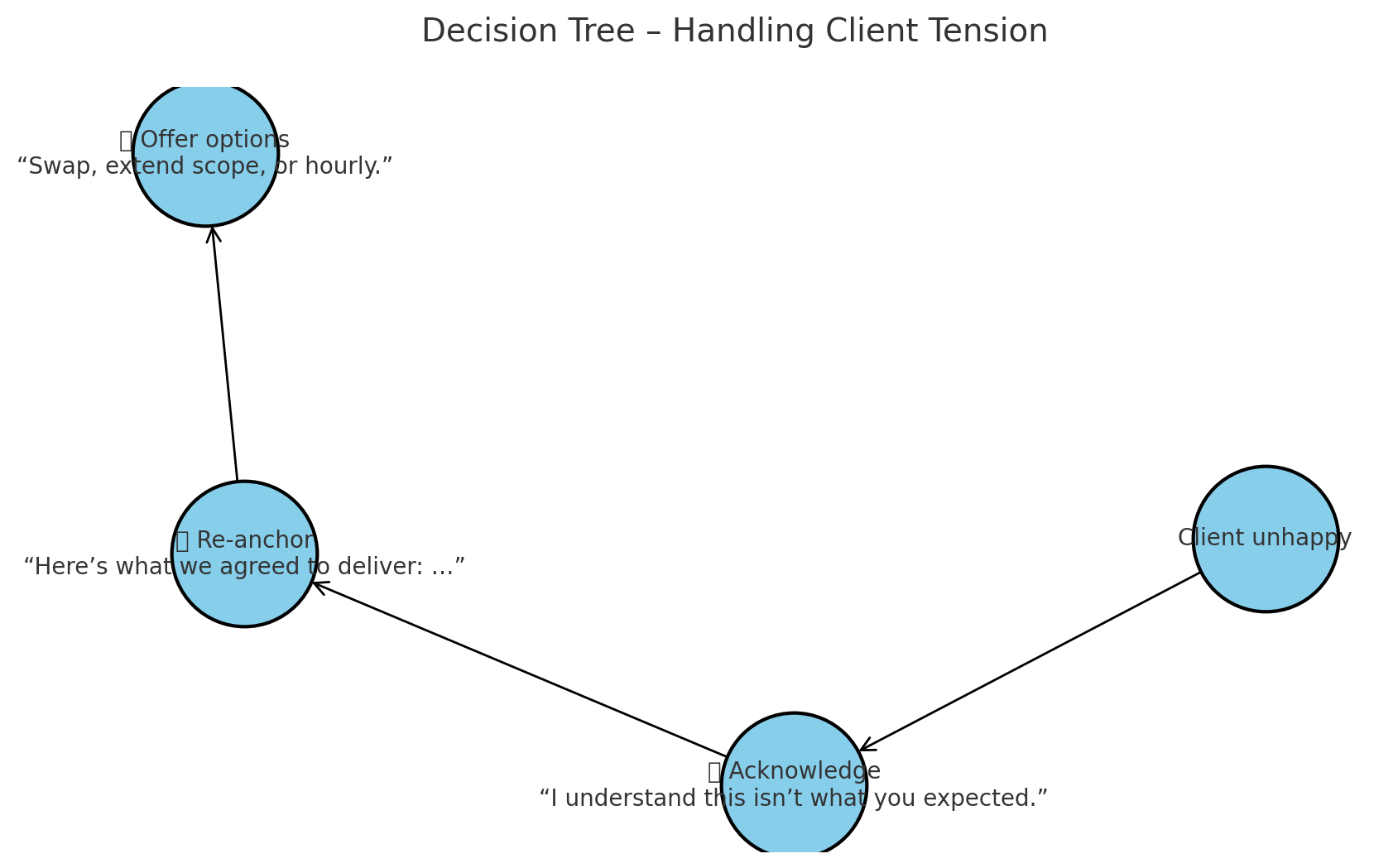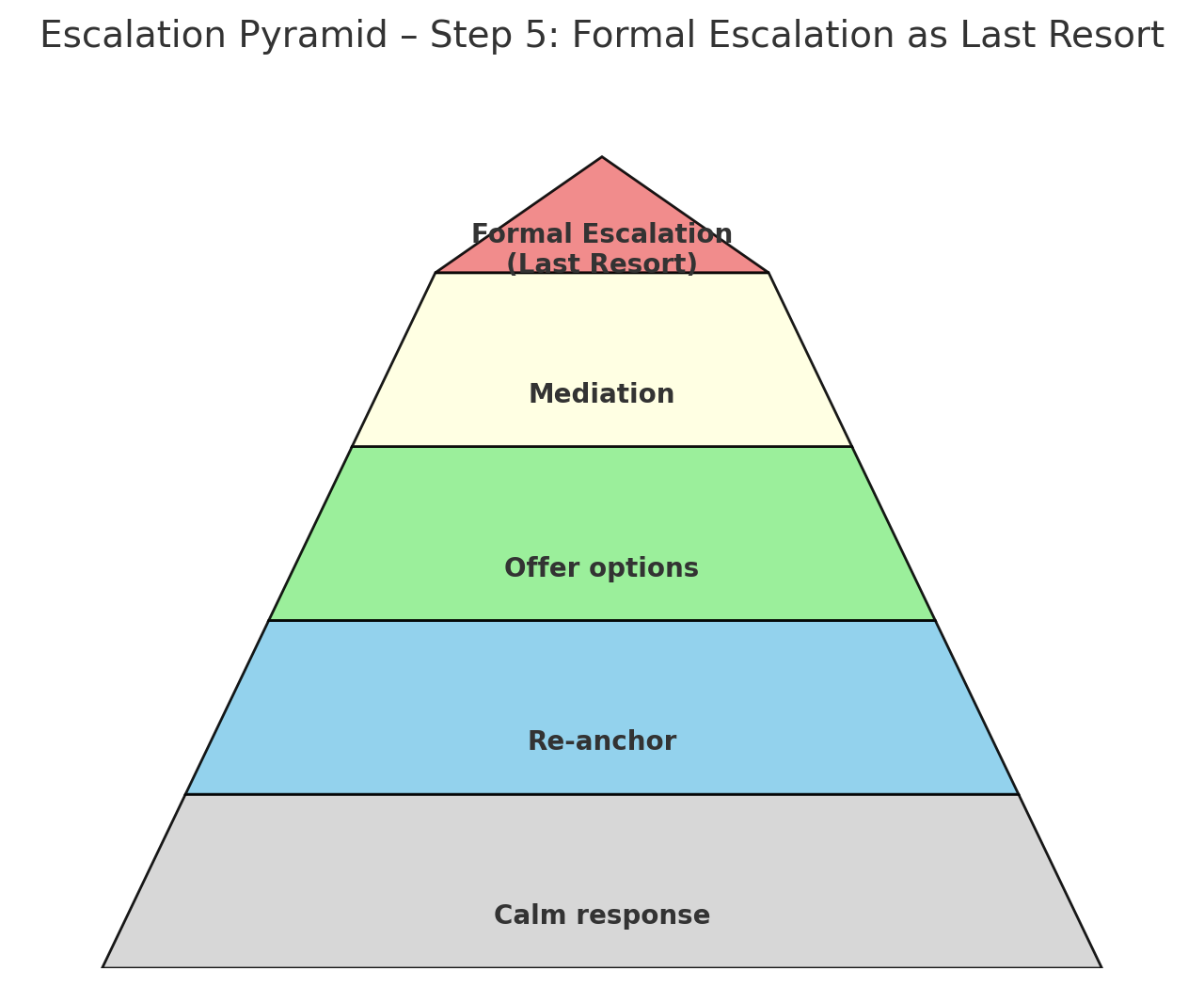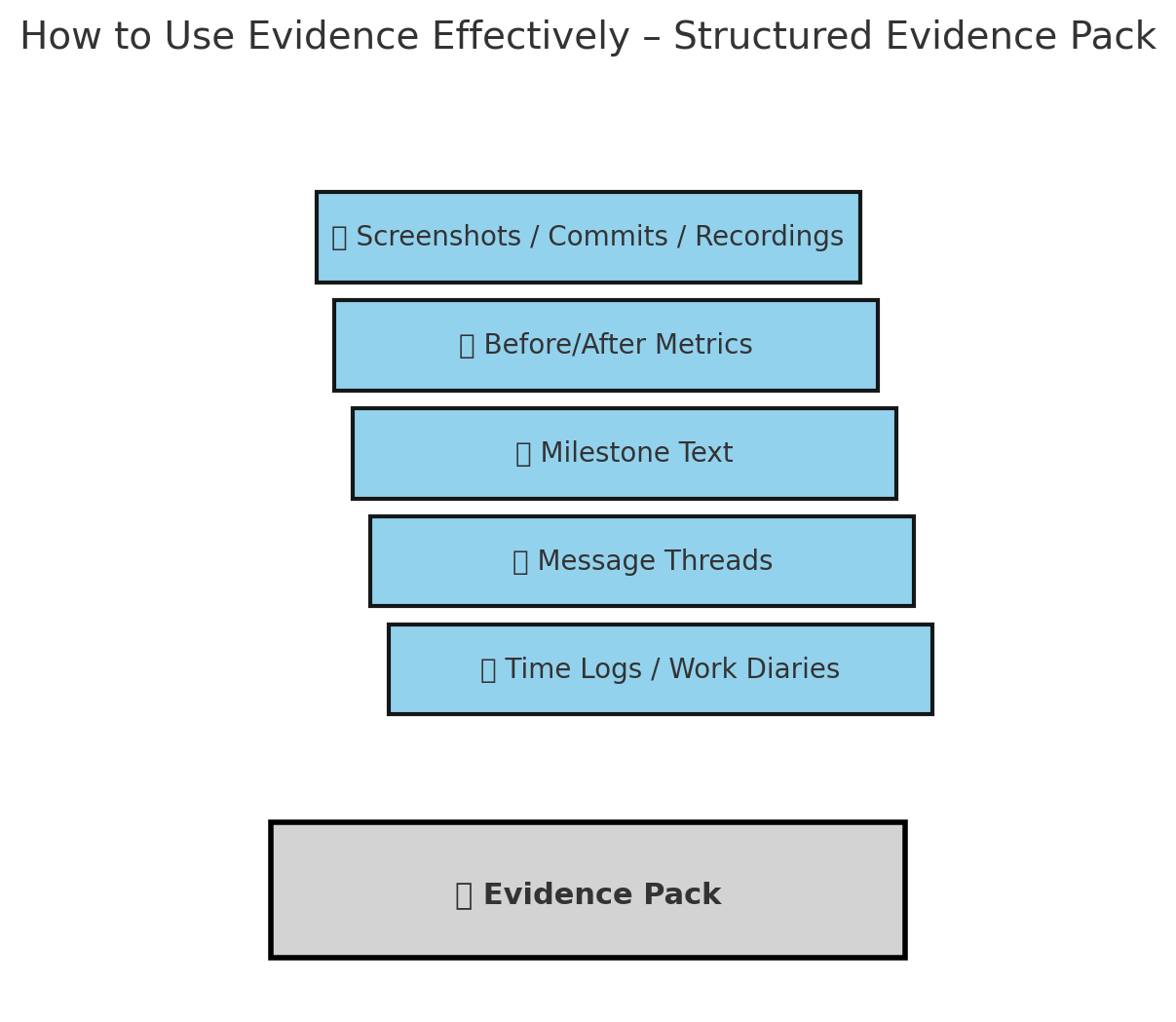If you run an agency on Upwork long enough, disputes are inevitable. Even with the best communication and airtight proposals, misunderstandings happen: clients change requirements mid-project, underestimate complexity, or expect revisions beyond what was agreed. Most agencies dread this part of the business — but handled well, a dispute can actually strengthen trust and sharpen your processes.
The key is to see a dispute not as a personal attack, but as an operational challenge. The Upwork dispute process agency workflow is designed to keep conflicts contained and resolved objectively. Your role is to stay professional, show evidence, and always bring the conversation back to documented scope and agreed milestones. When handled with structure and calm, even a tense disagreement can end in mutual respect — and sometimes continued collaboration.
Step 1: Preventing Disputes Before They Happen
The easiest dispute to win is the one you never enter. Prevention starts long before work begins. A clear, outcome-based scope of work and precise milestone definitions are your first line of defense. Every deliverable should include a “Done = …” line written in the client’s language. For example:
Done = PDP mobile LCP < 2.8s and CLS < 0.1 on three templates, with before/after screenshots and rollback notes.
This level of clarity turns vague expectations into measurable success. It also becomes crucial evidence if conflict arises later.
It’s also important to include an “Out of Scope” section in your proposal or first message. Listing what’s not included protects you when clients request unrelated features or additional work. Combine that with a simple change request policy (“swap, extend, or explore”) and you’ll prevent about 70% of potential disputes before they even form.
Regular communication matters too. Share weekly summaries of progress, deliverables, and next steps. Keep key conversations on-platform. A consistent written trail of what’s agreed, delivered, and approved becomes your strongest shield if a disagreement escalates.
Step 2: When Tension Appears — Stay Calm and Go Back to Scope
Even the best processes can’t prevent every problem. Maybe the client expected more revisions, didn’t read the acceptance criteria, or had internal changes that shift their needs. The first and most important thing to remember: stay calm and factual. Emotional responses escalate conflict; documented evidence resolves it.
When a client is unhappy, respond quickly but professionally. Acknowledge their concern, restate the agreed scope, and offer a solution path. Here’s a simple structure:
- Acknowledge: “I understand this isn’t what you expected.”
- Re-anchor: “Here’s what we agreed to deliver: [paste Done = line].”
- Offer options: “We can either swap X for Y, extend the scope with a new milestone, or explore additional work hourly.”
This approach shows you’re collaborative without conceding to endless scope creep. It demonstrates that you’re not ignoring their concerns — but also that projects operate within agreed terms.

Step 3: Direct Resolution — Your First and Best Option
In the Upwork dispute process agency playbook, direct resolution is always the fastest, cheapest, and most reputation-safe approach. Most conflicts can be solved at this stage if you stay professional and present clear evidence.
Here’s how to do it well:
- Gather the facts: Summarize what was delivered, when, and how it matches the scope. Include links, screenshots, commit logs, or Loom walkthroughs.
- Restate acceptance criteria: Remind the client of the original agreement. If possible, quote your proposal or milestone description directly.
- Propose structured options: Offer a small revision, a milestone extension, or an additional paid phase. The more choice you give, the less combative the conversation feels.
- Keep the tone neutral: Avoid blame or frustration. Phrases like “Let’s align expectations” or “Here’s how we can resolve this” work better than “You agreed to this.”
Agencies that consistently use this approach resolve about 80% of conflicts before they ever reach formal escalation. It’s your best chance to fix the situation without involving platform administrators or risking negative feedback.
Step 4: Understanding Upwork Mediation — The Structured Middle Path
If direct conversation stalls, the next step is Upwork mediation. This is a structured process where an Upwork dispute specialist reviews both sides’ evidence and helps facilitate a resolution. It’s not a courtroom — the mediator doesn’t “judge” but works to broker agreement within platform rules.
For agencies, mediation is often where clear documentation pays off. Your acceptance criteria, scope of work, message history, and delivery evidence become the backbone of your case. Mediators favor professionalism and objectivity, not emotion.
Here are some upwork dispute tips for mediation:
- Submit a clear, chronological summary of events. List dates of deliverables, client feedback, and any change requests.
- Attach or link to evidence (commits, screenshots, files, messages). Avoid long narratives — concise evidence is more powerful.
- Don’t attack the client. Stick to facts: what was agreed, what was delivered, and how that aligns.
- Show willingness to resolve. Offering a partial revision or credit signals good faith and often leads to a faster settlement.
Mediation is particularly valuable for fixed-price projects, where deliverables and acceptance criteria are easier to evaluate. For hourly contracts, Upwork primarily relies on work diary records and activity logs.
Step 5: Formal Escalation — Last Resort, Not Default
If mediation fails, the final step is formal dispute resolution. This is rare, but it happens — especially when there’s a material breach of contract, a client refuses to pay despite completed work, or one party disappears entirely.
At this stage, Upwork’s team reviews all evidence and issues a decision based on platform terms and the contract type. Their determination is binding. For fixed-price projects, they examine milestone descriptions, scope, messages, and evidence. For hourly contracts, they focus on work diary compliance and activity levels.
Formal escalation is slow and stressful, so it should always be the last resort. But if you’ve documented scope, delivered to spec, and maintained professional communication, your chances of a fair outcome are high.

Client Conflict Templates — Professional Messages You Can Copy
Here are several ready-made client conflict Upwork templates you can adapt to real scenarios.
Template 1: Early Misalignment (Direct Resolution Stage)
Hi [Client Name],
I understand this isn’t quite what you were expecting, and I want to make sure we get back on the same page. Here’s the original milestone description we agreed on:
Done = [paste acceptance criteria].
Based on this, the current deliverable meets the scope. If you’d like to go beyond this, we have a few options:
– Swap a planned task for the new request (equal effort).
– Add a follow-up milestone to include this new work.
– Explore the change with a short hourly sprint before committing.
Which of these would you prefer?
Template 2: Delays or Missing Dependencies
Hi [Client Name],
Just a quick update: we’re currently blocked by [specific dependency, e.g., missing API keys or feedback on design]. This affects our ability to deliver on schedule.
Once we receive [dependency], we can continue immediately. If there’s a delay beyond [date], we may need to adjust the timeline or split this into a follow-up milestone.
I’ll keep everything ready on my end so we can move quickly once we’re unblocked.
Template 3: Transitioning to Mediation (Calm and Factual)
Hi [Client Name],
I appreciate your perspective. At this stage, we seem to have different interpretations of the milestone scope. To ensure a fair and structured resolution, I suggest we initiate Upwork mediation. A dispute specialist will review the scope, deliverables, and communications to help us find a solution.
I’ll share all relevant documentation on my side, including the milestone description, acceptance criteria, and delivery evidence. Please share anything you think is relevant too.
My goal is still the same: to reach a fair and respectful resolution for both of us.
Template 4: Change Request After Delivery
Hi [Client Name],
Thanks for sharing the new requirements. These go beyond the scope of the current milestone:
Done = [paste original acceptance criteria].
We can absolutely handle the new request — here are three options:
- Swap: Replace one current task with the new work (equal effort).
- Extend: Add a new milestone to cover this work.
- Explore: Do a short, capped hourly sprint to size and plan.
Let me know which approach works best, and I’ll update the milestone accordingly.
Scope Clauses That Reduce Disputes by Half
Here are short, powerful phrases to include in every proposal or milestone to reduce the likelihood of disputes:
- Acceptance criteria: “Done = [clear result] on [specific pages/templates] with [evidence type].”
- Out of scope: “This milestone does not include new feature development, unrelated bug backlogs, or third-party costs.”
- Change control: “New requests will follow a change control process: swap (equal effort), extend (new milestone), or explore (hourly).”
- Revisions: “Includes [1–2] revision cycles. Additional revisions require a new milestone.”
- Support: “Includes a [7–14]-day stabilization period after delivery for regressions related to delivered work.”
These small details make your upwork dispute process agency playbook far stronger and prevent misunderstandings before they snowball.
How to Use Evidence Effectively
In any conflict, evidence is your best ally. Good evidence is concise, objective, and directly tied to the agreed scope. It includes:
- Screenshots, commit links, or screen recordings of delivered work.
- Before/after metrics (e.g., performance scores, analytics deltas).
- The exact milestone text copied from the contract.
- Message threads where feedback, approvals, or changes were confirmed.
- Time logs and work diaries for hourly contracts.
Organize these chronologically before entering upwork mediation. A structured evidence pack signals professionalism and makes it easier for mediators to support your position.

Lessons from Agencies That Win Disputes
Agencies with a strong track record in disputes share three habits:
- They document everything. They treat scope definitions and acceptance criteria as standard operating procedure, not optional extras.
- They never ghost or get defensive. Their tone stays calm and option-oriented, even when clients are upset.
- They use disputes to improve. Every conflict becomes a trigger for tightening internal SOPs — from milestone wording to feedback loops.
This mindset shift — from “disputes are bad” to “disputes are feedback” — is what separates reactive agencies from mature ones.
Final Thoughts
The Upwork dispute process agency workflow doesn’t have to be intimidating. With clear scopes, well-structured milestones, documented acceptance criteria, and consistent communication, most conflicts never escalate beyond a message or two. When they do, structured responses, concise evidence, and respectful tone turn disputes into manageable conversations instead of crises.
Use the upwork dispute tips and client conflict Upwork templates above as your standard playbook. See Upwork mediation as a tool, not a failure, and treat every disagreement as a chance to sharpen your systems. If you do, disputes stop being threats to your agency’s reputation — and start becoming proof that you know how to operate professionally, even under pressure.




.avif)
.png)
.webp)
